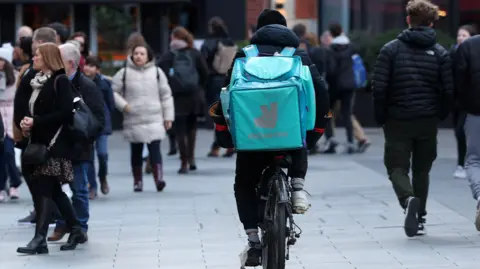**Minister to Meet Food Delivery Firms Over Reports of Illegal Workers**
In a significant move, the UK government plans to hold consultations with food delivery companies concerning alarming reports about asylum seekers working illegally as couriers shortly after their arrival in the country. This meeting is particularly urgent given recent revelations that some migrants arriving via dangerous sea routes are allegedly able to sublet delivery accounts from established workers through social media channels.
According to a report by *The Sun*, many refugees, particularly those who have crossed the Channel, have found ways to access and utilize the delivery services of companies such as Deliveroo and Just Eat. By doing so, these individuals have been reportedly earning considerable amounts, sometimes up to £1,000 a week. However, it is crucial to note that asylum seekers are legally barred from securing employment for the first twelve months following their arrival unless their applications are approved.
A spokesman from Downing Street emphasized the significance of addressing these issues head-on, condemning the illicit operations that undermine local businesses and wages. They stated that the government is committed to taking decisive action against this “racket.”
Major food delivery platforms including Deliveroo, Just Eat, and Uber Eats have publicly asserted that they enforce stringent guidelines and verification processes to ensure that only couriers with the appropriate right to work in the UK are allowed to operate on their platforms. However, the investigation by *The Sun* surfaced numerous online forums where individuals facilitated the rental of delivery accounts, raising questions about the effectiveness of these checks.
Conservative shadow home secretary Chris Philp expressed his concerns regarding the apparent illegal activities occurring at asylum hotels, referring to firsthand observations he made during a recent visit. Philp criticized Labour’s claims of vigorously combating illegal employment, pointing to clear evidence of illegal work being conducted within facilities managed by the Home Office headed by Yvette Cooper.
In response to these allegations, Border Security Minister Dame Angela Eagle is scheduled to meet with food delivery companies next week. This initiative is intended to strengthen oversight and regulation within the gig economy while addressing the complications arising from illegal employment. The government has taken a firm position stating that allowing such illegal operations to persist would damage legitimate businesses and exploitatively cut wages, neither of which are acceptable outcomes for British citizens.
In light of the accompanying reports, Just Eat declared their intent to bolster measures ensuring that all delivery personnel possess the right to work in the UK. They highlighted the implementation of mechanisms designed to allow couriers to report the use of substitutes alongside a series of verification checks, which now include facial recognition capabilities. Similarly, Deliveroo acknowledged the zero tolerance policy towards misuse of their services, emphasizing accountability among riders.
Uber has also reinforced its commitment, asserting that all couriers on the Uber Eats platform must comply with legal work eligibility assessments, promising continued development of detection tools aimed at identifying and expelling fraudulent accounts.
The situation surrounding asylum seekers and illegal employment has broader implications. Observations made by David Bolt, the UK’s independent inspector of borders and immigration, indicate skepticism regarding the government’s objective to eliminate the use of asylum hotels prior to the next election. He underscored that increasing refusals in asylum cases have led to a rise in appeals, complicating efforts to manage institutional capacities.
Consequently, these multifaceted issues raise vital questions about the roles played by government departments, various industries, and the interconnected nature of immigration and labor policies. With persistent challenges facing the asylum system and increasing pressures regarding public sentiment and economic conditions, the upcoming discussions promise to be pivotal in steering future strategies for Iraq.
In conclusion, this ongoing narrative surrounding illegal working by asylum seekers within the gig economy demands urgent and comprehensive responses. The UK government’s commitment to addressing these concerns reflects a desire to maintain both the integrity of local wages and businesses, while also navigating the complexities of migration and human rights within its borders.











